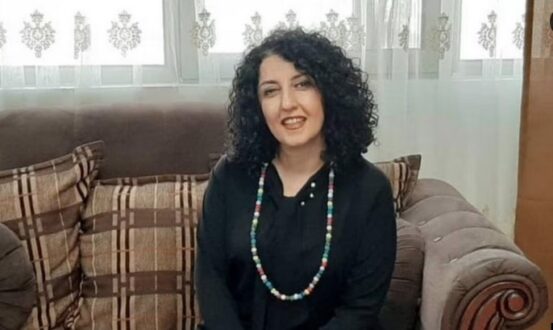RFL/RE – Imprisoned Iranian human rights lawyer and Nobel Peace Prize winner Narges Mohammadi has urged a boycott alongside “national sanctions and global condemnation” of next month’s legislative elections there, calling the moves “a political necessity and a moral duty.”
“Sanctioning elections under a despotic religious regime is not just a political move but also a moral obligation for freedom-loving and justice-seeking Iranians,” Mohammadi said on social media on February 24.
Mohammadi has previously described the clerically led Iranian leadership “criminal” and has long been a vocal critic of conditions for political and other prisoners in Iran.
She pledged that “I, alongside the informed and proud people from all over Iran, from Sistan and Baluchestan to Kurdistan, from Khuzestan to Azerbaijan, will stand to declare the illegitimacy of the Islamic Republic and the divide within the oppressive regime and its people through the sanctioning of sham elections.”
In January, an Iranian court extended the 51-year-old Mohammadi’s prison sentence by 15 months for “spreading propaganda” against the Islamic republic while in jail. It was her fifth conviction since March 2021 and the third for activities from prison, where she was sent for alleged actions against national security and propaganda against the state.SEE ALSO:Iran’s Clerical Rulers Face ‘Legitimacy Crisis’ Ahead Of Elections
In her February 24 post, she criticized Iranian authorities’ “ruthless and brutal suppression, the killing of young people on the streets, the executions, and the imprisonment and torture of men and women.”
A number of prominent Iranians outside the country and some political and civil activists in Iran have already called for a boycott of the March 1 voting.
Officials routinely vet to exclude large numbers of candidates who are critical of the regime from elections to fill seats at all nearly all levels of government.
“Transition from the despotic religious regime is a national demand and the only way for the survival of Iran, Iranians, and our humanity,” Mohammadi said.
Mustafa Tajzadeh, a jailed former reform-minded politician, said in a letter he published on February 29 from Tehran’s Evin Prison that the leadership’s strategic mistakes are “making elections meaningless and making elected institutions ineffective…especially the parliament.”
Elections for the parliament, the Majlis, are scheduled for March 1 along with voting to fill the Assembly of Experts, with a majority of would-be candidates already disqualified.
Some government polls also indicate that there is waning interest in the votes.
The Iranian Students’ Opinion Center (ISPA) said research in February suggested only 36 percent of Iranians were aware of the upcoming elections.
A brutal crackdown on dissent followed widespread protests and unrest that broke out after the death in custody in September 2022 of 22-year-old student Mahsa Amini after she was detained for a dress-code violation and, according to eyewitnesses, beaten by the morality police.
Iranian officials this week officially outlawed the use of tools such as virtual private networks (VPNs) designed to bypass Internet censorship following a directive from the country’s Supreme Council of Cyberspace that was endorsed by Supreme Leader Ayatollah Ali Khamenei.
 Shabtabnews In this dark night, I have lost my way – Arise from a corner, oh you the star of guidance.
Shabtabnews In this dark night, I have lost my way – Arise from a corner, oh you the star of guidance.



